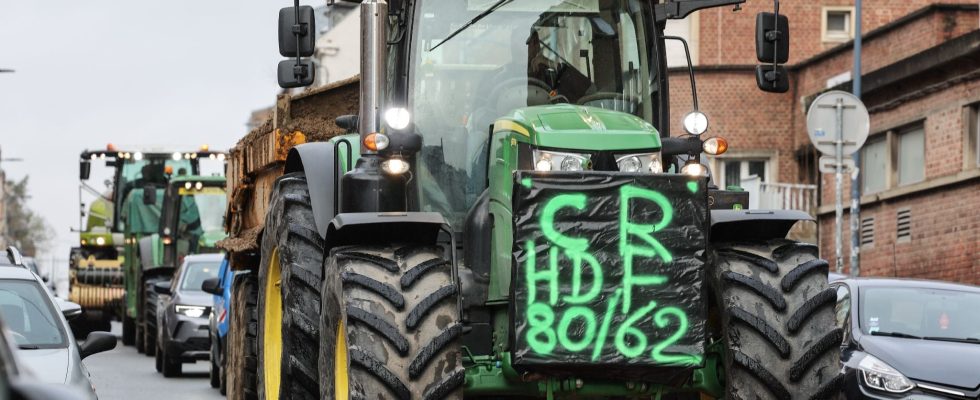Abandonment of compulsory fallows, hedges, controls… The Twenty-Seven approved, on Tuesday March 26, a revision of the CAP unraveling its environmental rules, and discussed ways to boost farmers’ income, while clashes broke out between demonstrators and police in Brussels.
To the great dismay of environmental NGOs, the European Commission proposed in mid-March to relax or even remove part of the “green” criteria that the new Common Agricultural Policy has imposed on farms since 2023.
Demanded by States in the face of agricultural anger sweeping the continent, these legislative revisions were ratified without substantial change by representatives of the Twenty-Seven and will now be examined urgently by MEPs.
250 tractors in Brussels
The subject was also discussed by the Ministers of Agriculture meeting on Tuesday in Brussels, while around 250 tractors according to the police converged in the European district, after previous mobilizations in February.
Horns, egg throwing, hay or tire fires, but also clashes: a man was arrested for throwing molotov cocktails and two police officers were injured, according to the police, who used gas tear gas and water cannons. “We have not forgotten the farmers! We are attacking the CAP to provide more flexibility, responses which will increase their income,” declared Belgian Minister David Clarinval.
Brussels is proposing to completely remove the obligation to leave at least 4% of arable land fallow or non-productive areas. A requirement which was part of the green constraints deemed impractical by agricultural organizations. The obligation to rotate crops would be replaced by simple “diversification”, the maintenance of permanent meadows would be considerably relaxed and, in the event of extreme climatic episodes, exemptions would be possible to avoid penalties.
Finally, farms of less than 10 hectares would be exempt from controls linked to environmental rules. So many measures approved by a qualified majority of States, despite Germany’s reluctance.
“It is not with old recipes that we will obtain better results. We must avoid the trap of thinking that by endangering the harvests in 10, 20 or 50 years, we are doing a service to the farmers”, s is annoyed the German minister, the ecologist Cem Özdemir.
“Throwback”
“The concern was to declare things which do not materialize in farmyards: we must ensure that these proposals are refined and clarified”, particularly on meadows, “but this package as proposed will in the right direction”, welcomed French Minister Marc Fesneau.
Copa-Cogeca, the organization of the majority European agricultural unions, also welcomed “increased flexibilities, taking into account local specificities”.
Conversely, 16 environmental NGOs, including WWF, Greenpeace and ClientEarth, called on Monday the Commission to “withdraw its legislative proposal”, a “step backwards” likely to degrade ecosystems. They say they are “dismayed” by its development “in less than three weeks […] without impact study or significant consultations” going against EU rules. Another project: guaranteeing “fair” prices to farmers in the agri-food chain in the face of pressure from processors and distributors.
The European Commission has unveiled a “road map” proposing the creation of an “observatory” on production prices and an evaluation of existing rules on unfair commercial practices, without new legislative proposals for the moment. In “echo” of the French Egalim rules, “the Commission is opening this question of remuneration at European level for the first time. We must continue to work, but let’s not ask to settle in 15 days what has been dragging on for 20 or 25 years”, commented Marc Fesneau.
Customs duties from which Ukraine benefits
Not enough to convince the protesting farmers of the Walloon union Fugea, who denounce “insufficient proposals to tackle the root causes” of agricultural unrest and demand “the end of free trade agreements” deemed unfair.
“We do not yet see any proposals to resolve this problem of imports coming from third countries at similar or lower prices but not respecting our high standards on the environment and animal welfare,” recognizes Latvian Minister Armands Krauze.
Another sensitive subject: the recent agreement to renew the exemption from customs duties enjoyed by Ukraine while capping certain agricultural products. It will be examined on Wednesday at the level of the ambassadors of the Twenty-Seven, certain States, including France, demanding that this cap be extended to wheat.
